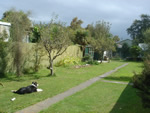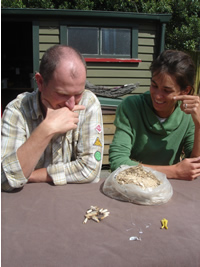One year, one rubbish bag: Waveney and Matthew's eco-challenge
Matthew Luxon and Waveney Warth are a young couple who've set themselves an unusual household challenge for 2008 - using just one Christchurch City Council rubbish bag for an entire year.
The couple have been amazingly successful so far, with some cigarette butts (found in the woodpile), a number of clothing tag plastic loops, a plastic clothes peg and a quantity of paint chips and sanding dust the only material ready to go in their council bag.
On the door of their weatherboard and brick villa just outside the four avenues, there's a hand-written sign on a piece of cardboard: Welcome to our rubbish-free house.
The house was built in an era when people lived more sustainably, Matthew says. It has a couple of fruit trees, a glasshouse and room for a large compost bin and an area for some chickens. The house is set forward on the section, which allows the sizeable back yard to be used to support them.
Matthew, who works four days a week as a social worker, says that the amount of media interest has been surprising, but that people need an example of how to live in a sustainable way.
Challenge Details
On their website, the couple say: The challenge is for the household to create no rubbish for the landfill from February 1, 2008 to February 1, 2009. However it is very likely that, despite our best efforts, some rubbish will be unavoidable. We challenge ourselves to keep this in no more than one official council rubbish bag.
We are:
- Exercising consumer power! During 2008 we will choose not to buy anything that is has non-recyclable packaging or is in itself junky, plasticy, disposable etc
- Asking friends and family not to bring (or send) any rubbish to our home, so beware the humble packet of biscuits!
- Making things ourselves to avoid packaging, eg baking muesli bars (granola bars).
- Reduce… Reuse… Rehome… Recycle… the four Rs are a big part of the plan to eliminate rubbish
- Composting: We have two systems on the go, a standard one for food scraps and lawn clippings, and a longer term one for things that take a bit longer to break down, like nail clippings, hair and dog poo.
- Gardening and maybe even preserving etc (ugh! sounds like hard work).
- Buying second-hand: This is the only way to buy some things that usually come with packaging when new.
"It seems to be that having an example - being able to say we are living by composting and recycling - and it's not that hard, has really helped people nail it down. It can be a little bit vague otherwise."
The couple bought the property from an owner who had lived there 55 years.
"They raised two children here," Matthew says. "He wasn't into trees, unless they were productive. There was a lemon tree out the front, three apple trees, rhubarb and this huge garden, and the glasshouses were full. Everything was functional."
Most food plants are in the glasshouse, and a smaller patch grows potatoes and corn and other stuff "that goes well outside".
 The soil at the property is "surprisingly sandy" and so the couple are learning ways of building up the soil to help plants thrive.
The soil at the property is "surprisingly sandy" and so the couple are learning ways of building up the soil to help plants thrive.
"We're noticing the crops aren't as good as the first year we were here. So we compost. We have friends who are much more natural gardeners than we are so they're advising us about seaweed and manure."
The couple have spent a lot of time researching and trying to find out how to make the best use of their land and how to recycle everyday objects.
"We don't know how to garden - that is a huge obstacle in itself," Waveney says, "but the more you do it the better you get".
 The couple say that they were not "particularly militant" about organics prior to the switch, and were around a "variety of opinions".
The couple say that they were not "particularly militant" about organics prior to the switch, and were around a "variety of opinions".
Waveny says: "It was a leap and a journey. We were already recycling everything we could and composting, which is about 75% of what goes in people's [rubbish] bags. We were ... just trying to do the right thing and feeling frustrated at how hard it is to do the right thing."
A trip to the recyling plant helped establish exactly which items will be taken at the gate, Matthew says.
"We were surpised how much they would take. Like breadbags. Probably the biggest change has been dairy foods. Going into a supermarket and realising that all of the sour cream, cream cheese - we haven't found any that's not in a No. 5 [unrecyclable plastic] - it needs to be No. 1 and No. 2. Dairy section's pretty much out."
Waveney broadens the scope: "The biggest thing is food generally. Food in some ways is easy, because there's always alternatives. You can chose to not buy something and buy something else, whereas you can get really stuck on toothpaste."
"The way we cook dinners has changed. I thought a lot about how to plan for spontenaity. [We wanted to] continue being haphazardly spontaneous - that's what were used to. When we were doing our trial that's when we observed that we were creating rubbish when suddenly friends came over or suddenly we went out. We don't want to stop doing that stuff. We're trying to keep ahead of it."
So the couple make food ahead and freeze it, or buy meat from the butcher (wrapped in newspaper) and have convenient food supplies on hand if need be.
Another big change is that the couple hardly ever go near a supermarket.
"We find that the supermarket ... it's probably easier to avoid it," Matthew laughs. "It's really convenient in terms of you go to one place and buy it all, but the packaging side of it is not convenient ecologically."
 The change of lifestyle has also meant discovering a whole range of local retailers who specialise in bulk items and minimal, recyclable packaging, Waveney says.
The change of lifestyle has also meant discovering a whole range of local retailers who specialise in bulk items and minimal, recyclable packaging, Waveney says.
"We've started to go to Bin Inn, the butcher, the organic wholefoods store - which has a whole range of things like brushes that are wooden and a few other thoughtful things - that's where I get our toilet paper. Then there's the baker, the fishmonger or the cheesemonger... "
"At first we were quite overwhelemd by that. You think it's bad enough having to go to one place - imagine having to go to five. It just occured to me one week that the majority of this stuff you don't need to buy every week. Fruit and veg you need to buy every week, but we started buying bulk, so I don't think we spend more time shopping than we used to.
"It's so easy. It's easier now than when we used to go to the supermarket. You feel like the supermarket is the quickest thing, but you do walk a lot and get jammed up in the queues."
DIY work is also part of the challenge - one of the largest items in the council bag at the moment is collected paint scrapings and sanding dust from the paint on the side of the house. MDF - a treated wood product - used in a home project is also posing a challenge.
"It's made us aware of the whole process," Waveney says. "When you buy something you don't see it as glorified rubbish. Doing rubbish free is making us think at the buying stage - 'what are we going to do with this amount of rubbish?'."
"One thing is toxins - whether you are painting your house or buying a piece of wood - if you get something that is organic or good for the environment, then when it is finished you can deal with it on your property. You're not going to be introducing lead or whatever into your garden, so we can compost it or burn it or whatever. That's a huge part of being rubbish free."
"Imagine if everyone had to live with their own rubbish on their own land for a year - [they] wouldn't be buying poison any more."
The garden has been a learning curve, but the couple say they have managed to grow most of what they need. Work to raise the garden beds and use seaweed and horse manure to enrich the soil is under way.
"We can do this project without gardening at all," Matthew says.
"We're just saving a trip to Raeward Fresh or wherever - it's not hard to buy fruit and veges without packaging," Waveney adds.
"And money," Matthew quips, "plus it gives us a place for compost".
Friends and family have been supportive, Matthew says.
"No-one's been calling us freaks."
Christchurch City Libraries will visit the couple again later in the year for an update on their progress. You can check the couple's progess on their website, Rubbish-free Year.








